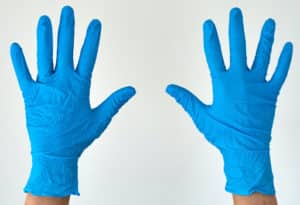Dental visits aren’t always the most looked-forward-to appointments out there. Most of us simply finish our current visit, schedule one six months out, and proceed to forget about it until we start getting calendar reminders. But did you know that this habit of divorcing ourselves from thinking about dental health doesn’t just effect our appointments?
That’s right! We often don’t think about how our dental health intertwines with our overall health.
Gum disease, for example, is linked to a whole host of overall health concerns including heart disease, diabetes, and rheumatoid arthritis, but we rarely, if ever, make the connection between them.
Nowhere is this more prevalent than in the cases of allergies.
In order to prevent a reaction, those of us with allergies have begun to check our food and household items for allergen contaminants, but we often forget to apply these same cautions to dental materials. Don’t skip thinking about this potential source of harm, and always be sure to tell your dentist about any allergies that could be a cause for concern.
Sources of Dental Related Allergies
Affecting over half of the population of the United States, allergies are extremely common. They are also as diverse as they are widespread, with people having reactions to everything from the pollen in the air to the red dye used in commercial candy. If you have any sort of adverse reactions to the following allergies, it would be wise to let your dentist know beforehand.
Seasonal Allergies

In 2018, allergic rhinitis, also called hay fever, affected approximately 28 million people in the United States. The allergic response these seasonal allergies produce is caused when the immune system reacts abnormally to a foreign substance, in this case, pollen. In most cases, an individual will have to suffer through itchy eyes and sneezing for the duration of the allergy season, but more complications may arise during a dental procedure.
Allergy susceptible patients may see some indirect problems occur during your visit. Allergies often plug up the nasal cavity and force you to breathe through the mouth, and doing this can cause your mouth to become dry and your teeth to become sensitive. The hypersensitivity reactions that occur can cause toothaches and irritation resulting from specific dental material types.
Food Allergies

Allergic reactions to foods are also fairly common, as about 32 million people in the United States have an allergy to specific foods. The 8 most common allergens are milk, eggs, tree nuts, peanuts, shellfish, wheat, soy, and fish. Testing for food allergens is usually done through a patch test, skin prick test, or a blood test. Please contact your doctor for professional medical advice regarding an allergy test.
These food allergens can be found in restaurants and grocery stores-alike, but some may be found within common dental materials as well. Fluoride, gum and sealant materials, and prophy pastes can contain dairy protein, gluten, traces of peanuts, and other flavorings that could be derived from an allergen. Oral medicine and oral hygiene products like toothpaste given by your dentist could also contain traces of food allergens.
Other Common Allergen Sources

Beyond food and pollen, people may have an allergic reaction to a whole host of items commonly used in dental care practices. Undergoing patch testing for these common irritants may be beneficial if you have noticed a burning sensation or other adverse reaction after a trip to the dentist.
A visit to the dentist often spells trouble for people with a latex allergy as latex is a key ingredient in most rubber products. Rubber gloves are used in every single dental procedure, so it is extremely important that you inform your dentist if you have an allergy to latex. A nickel allergy is also something to watch out for in dentistry. Fillings and crowns often use nickel, so it would be smart to consider dental implants as an alternative.
Some people also react negatively to local anesthetics, though this is most often a symptom resulting from anxiety or epinephrine. Other chemicals and dental materials in a dentist’s office may cause allergic dermatitis around and inside the mouth. Dental bonding agents, for example, are known for inducing contact dermatitis, and composite restorations may cause some reaction due to the conditioning liquid, composite resin, or tools used in the procedure.
Navigating Your Dental Appointment with Allergies
Knowing that such potential allergens are so common in dental care may make you a bit more nervous to make that next trip to the dentist. Don’t let it scare you though! There are three easy steps to take to make sure your next visit is allergen-free.

1. Make Your Dentist Aware
Healthcare workers like dentists strive to make sure that their dental patients receive the best dental care possible, and that includes minimizing the risk of an allergic reaction.
Most adverse reactions can be prevented by simply bringing your allergies to the attention of your dentist. So, if you have seasonal allergies, food allergies, or allergies to a product used in dentistry, let your orthodontist know so they can find alternative materials to use.
2. Speak Up
An adverse reaction to dental materials is not fun for anyone, especially for people having allergic reactions. If you believe that you are at increased risk for harm resulting from potential allergens, speak up! Your dentist will immediately check the ingredients for the material they are using, and make sure to switch it to something that will make you feel safe.
It’s always better to be safe than sorry when it comes to allergies. If you have any questions regarding the dental materials your dentist will be using, speak up and ask them.
3. Know When to Stay Home
As important as going to the dentist every six months is, your health always needs to come first. If you are suffering from a horrible bout of seasonal allergies or hypersensitivity reactions, your dental care probably won’t be as good as it could be. Don’t put yourself through that, just call your dentist and reschedule for when you’re better.
Your dental practice should care about your allergies, and at Tree City Family Dental we do just that! We welcome any questions regarding the dental materials we use, and we will gladly swap these materials to be more allergen-friendly if need be. Don’t be scared to book your next appointment. Contact Tree City Family Dental for a worry-free checkup!

